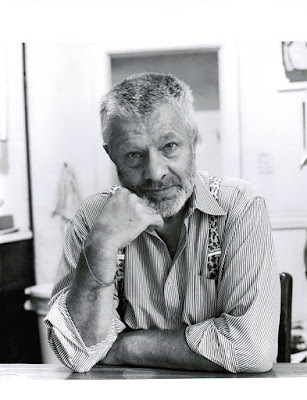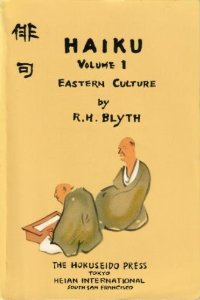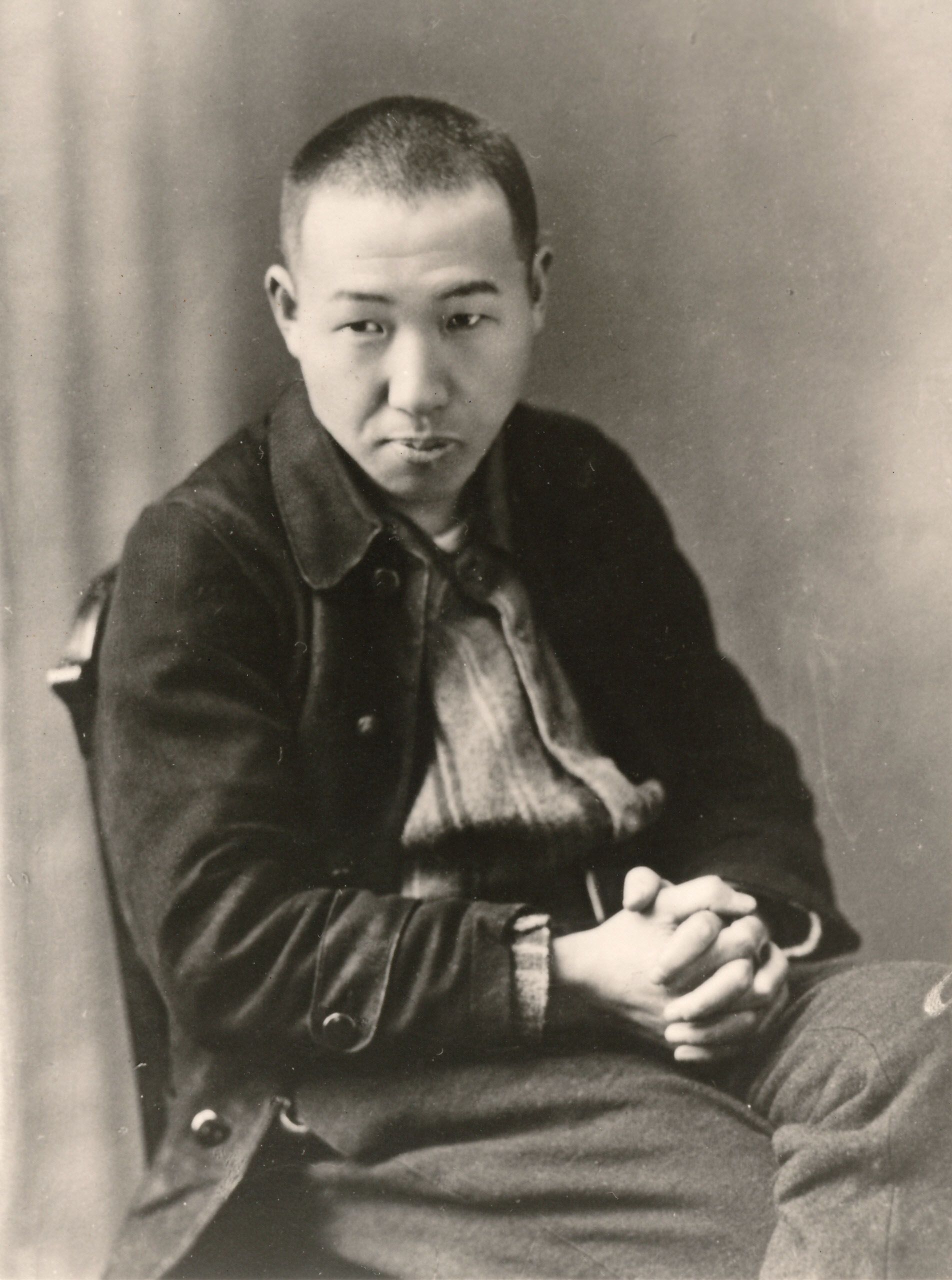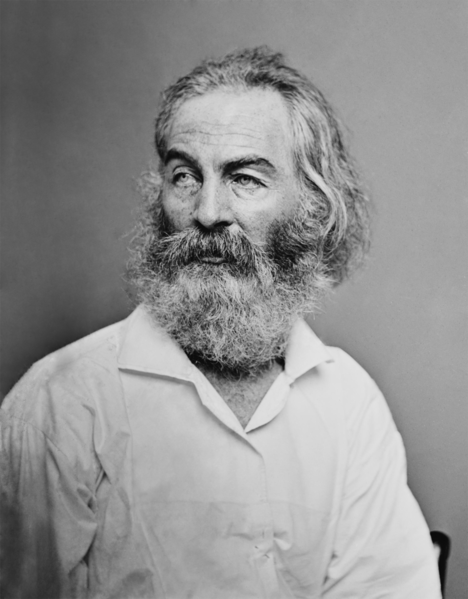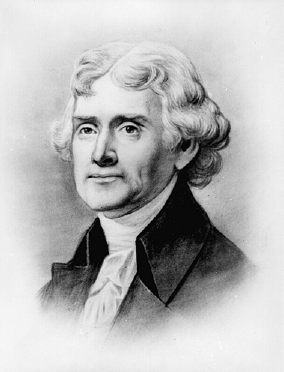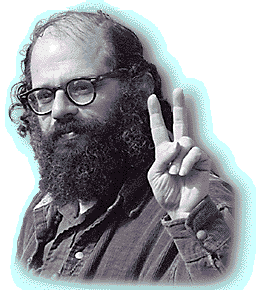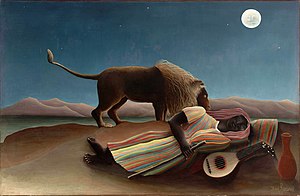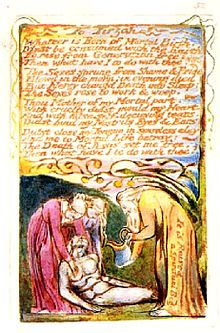AG: Yeah, well, the fact is, people don’t realize it. The half-life of plutonianis twenty-four thousand years.. before the plutonian becomes physically inert.. The full life of plutonian is two hundred and forty thousand years. And what you realize (is) that according to the "born-again" people (who love nuclear stuff), according to their interpretation, the earth is only six thousand years old to begin with - the Garden of Eden was 404 BC ! So plutonian itself lasts something like four times as long as the Garden of Eden! (in half-life!)
WI: Isn't that wonderful!
AG: What are they gonna do? Send armed guards to sit on elevators to guard.. in the Panhandle for twenty-fourthousand years? That's the biggest vanity you ever heard of!..
WI: I know
AG: ..ancient Babylonian(s) (thinking) it will last forever!![]() WI: It seems like history repeats itself, but (and) the weaponry is the only thing that changes.
WI: It seems like history repeats itself, but (and) the weaponry is the only thing that changes.
AG: Yeah, but I don't think we've seen this particular one before.....
WI: No
AG: What they..
WI: But it still seems the same old power struggle. I don't know. Maybe I'm off-base.
AG: Well, the inventor of the Bomb said, because we have an absolute weapon that is going to be absolutely up-to-date, we don't have to change it. Einstein-ian man will have to have a change in consciousness in order to deal with the unobstructed aggression (and find) a viable and workable situation...
WI: Exactly.
WI: I just have one more question, if you’d be kind enough to..
AG: I don’t know if I answered your (last) question.
WI: You did, you did. In fact, it’s amazing. I’ve got a list of questions in front of me, you answered every one of them without my having to answer them – that’s crazy!
AG: What haven’t we covered?
WI: The only thing that I was wondering about, you know, in the light of all that’s going on. I hear a lot of negative stuff on the street nowadays, but I was wondering - I like to try and be as positive as I can – I was wondering, what you think.. what direction poetry is headed in?
AG: Well I think it’ll have to be.. Well, I’ll give you… anybody who wants to know, come hear my poetry reading tonight at the University of Maine..
WI: Ok
WI: We’re going to be getting in touch with them too.
AG:…tonight, tomorrow and Wednesday, Thursday, at the University of Maine at Orono. My reading is at seven-thirty tonight - but what we’re all, four of us, doing (is) our thing here - trying to check out our own minds, trying to say, in public, what.. the way we talk to each other in private, talk to ourselves.. and (to) deal withthe thoughts that pass through our heads, and put them out in public. So it’s not high art thought.
WI: Ok.
AG: So I don’t see how poetry can go anywhere except through that kind of sincerity, whatever form it takes, whether it’s written in sonnets or written in vernacular (though I think it will be tending more towards the idiomatic and vernacular language). I think the poets will pay more attention to the tones of their voices, the different pitch of the vowels as they speak them, because it's the tone that gives you the feel of the emotion, like tone leads the pitch, like, the way I’m talking to you now. So just like when you talk to a baby, I know people who.. (so) you find tones which people can understand, you find the rhythms that people use in their everyday speech, that people will recognize, like (Bob) Dylan, instead of being up there like a narcissist making up a beautiful lot of castles in the air, talking about our real problems, (talking in the) pitch of idiomatic speech and the rhythms of idiomatic speech, find those rhythms which are more vivid, most muscular, characteristic of our speech, and compos(ing) poems out of those rhythms. In other words, making poems out of our own lives.
WI: That sounds pretty good to me
AG: ...or turning our lives into awareness
WI: Alright!
AG: … an aesthetic understanding and practical, workable, common-sense, communication between...
WI: Sounds great yes yes I agree.
AG: Why not?
WI: Yes
AG: Once and for all!
WI: I agree
AG: Originally (that) was what the Beat Generation was about - you're getting out from under a whole boat-load of.. (woe), and, when it came.. more to.. ((not) trying to rehash old poems, trying to write pretty poems that sound like everybody else - Hiawatha!), (but, instead) begin talking turkey about our own feet, eyes, brain, thoughts, mind, speech….
WI: That sounds good. You know, what makes me feel feel really high is the fact that I thought that when I was reading (of course, I didn’t have anything to bounce it offbut now I’m hearing you say it. So I guess I got the message
AG: Well, we got a couple of slogans that go with that – “Writing is writing your mind” (so) write your mind
WI: Okay.
WI: First thought best thought.
AG: That goes for painting too, I guess.
WI: Yeah..sounds right to me. I don’t see a difference myself. The only thing I see is the difference in tool(s).
AG: Yes, It’s just a different means of expression, but (there) spoken. Painting is with the material, Speech is with the breath and the air..
WI: Yes ..and recently we interviewed a dancer, and I said when I watch dancers I see paintings in space, and that’s how I feel about poetry, and then what you did tho’, to me (in those years, and I was I guess..)
AG: How old are you now?
WI: I’m.. I’ll be fifty in two weeks.
AG: I’ll be sixty tomorrow!
WI: Oh well, congratulations!
AG: Well, my sixtieth birthday, I survived!
WI Well, I’m glad, I’m glad. I think the world’s a better place with people like you.
AG: Like most of those poets that were friends, we all survived pretty well, better than the academic poets, a lot of the academic poets drank themselves to death early.
WI: Well you exercised and they didn’t.
AG: Yeah, I exercised. and also we had other stimulants besides killer alcohol and killer tobacco..
WI: Yes yes, yes, definitely, definitely.
AG: ..or (the) killer crack, or whatever they’ve got now.
WI: Yeah, there’s a new one every day, it seems like! Whatever makes the most money!
AG: Well, for one thing, I think about marijuana, was that, at least it wasn’t commercialized by big companies…
WI: True
AG: ...whereas tobacco kills..kills .. and alcohol, of course, causes awful car-crashes, whereas somebody who drops LSD… one person.. (it makes) a newspaper-headline. (It’s) really disproportionate.
WI: I know.
AG: Maybe some of the bad humor in America is alcohol and coffee..and nicotine – the bring-down..
WI: Yeah, definitely, it sure puts you in the cave.
AG: Well, it makes you nervous - "(I) wanna build that, I wanna build "Star Wars", build another laser beam to dominate space".
WI: Well, maybe that’s why they’re always after somebody else’s power, because you lose so much of your own power when you use those kind of drugs..
AG… You go into a bar and see a drunk trying to get power over the others – [Allen then puts on/mimics a drunken inebriated arrogance] - “Yeah, you can’t talk to me that way!"
WI: Yeah, yeah, “I’ll hit you in the head”, or whatever.
AG: “You can’t talk to me that way.”
WI: Yes, definitely. Well, listen, I really appreciate this.
AG: “Bomb Libya, that's what we've got to do, bomb Libya, they can’t talk to us that way! I wish Libya, was Syria! We should’ve bombed Syria, not Libya!" [sic – 2013, Allen's prescient black-humor - this is, don't forget, 1986!] - like a bunch of punch-drunk drunks!
WI: How are they gonna use all that stuff now?
AG: Well, they’ve paid so much money for it, they’ve got to find a use for it.
WI: Oh yeah.
AG: They’ve got a whole economy practically built on it. They’re robbing all the money from the poets and the artists and shifting it all over to the pigs in the Pentagon (by “pigs”, I don’t mean that they’re pigs in the sense that.. (but) they’re at the trough, the so-called "pork-barrel".
WI: I think it’s time for all the artists in the world to take over now because…
AG: I think it’s time for the citizens to take over
WI: Well, these other guys have had their chance, right?
AG: Yeah and they’ve just about wrecked the economy
WI: Yeah, they wrecked the planet..so I think..I don’t know too many destructive artists myself!
AG: Oh, all artists are...
WI: I guess you’re (right).
AG: But they’re exercising it in art rather than in threatening life with mustard gas or lasers or atom-bomb. Because, if you explode an atom bomb in a poem, nobody gets hurt..
WI: Right.
AG: ..whereas in real life, everybody’s got their little Chernobyl vegetables that they've got to dump.
WI: And for a long time to come too!
![Maine Lesson Banner]()
AG: So what’s going on in Maine?
WI: Well, Maine to me is the cave. It was funny because I was saying to a friend of mine today, Jeez, ya know, before I moved to Maine, I used to... Allen Ginsberg’s name used to pop up here or there or somewhere, anywhere, you know what I mean?
AG: Uh-huh
WI: And then I moved to Maine in 1970 and I never heard of you again!
AG: Good for me!
WI: I never heard of anythingagain! So.. but, and, along with that wave, another wave was developing, and that’s the wave of the artist. Like, when I first came up here, sixteen years ago, it was very rare to meet anyone that spoke about writing or performing or whatever, now everywhere you look is exhibits, readings, shows, plays, music events, it’s great!
AG: I wonder, however, if that isn't the fore-runner of the pushing out, the invasion of the so-called civilization..
WI: Oh that’s what’s going to happen, I’m sure.
AG: I’m wondering if the number of artists who seek refuge up here in the appeal for free expression and civilized communication. I wonder if that isn't.. a sort of a biological feeler, in advance of the heavy wave, heavy investment, that’s coming later. It may not be such a good sign.
WI: I agree with you there. In one respect, it seems to be a blessing and in another respect it definitely could be that the life-boat’s going to get too full too fast.
AG: Yeah, well, what it’s also going to mean is that the artist community, the first wave, is going to be supporting what’s coming ahead and...
WI: Yeah, That too. I see.
AG: It is likely that the first wave, the first signal, will be attacked, or censored, or be vetted and not realized that the artist is doing a service in reporting the problem (of what might have been) the demon of Greed, that is to say.. greed..
WI: It sounds to me.. It sounds to me.. Oh yeah. Mammon, the God Mannon. It sounds like that’s what you’re doing here now..
AG: Well what we’re doing is, actually, teaching poetry, basically teaching sensitization of mind, which is a new thing, teaching people to notice what they notice, (and trying myself to notice what we notice), notice our own surprised mind, and noticing the vividness of our experience, appreciating the vividness of nature itself, and that is our riches, instead of..
WI: Yeah that sounds great to me...sounds good to me. My only regret is I don’t have any way to get over to Orono.
AG: ..Well there are people who live up here. Seven-thirty at night I’m reading. So, if you jump into your car, (and if there’s any) aging beatniks that want to hear what I’m writing this year, then they're all welcome.
WI: Yeah, my car is two worn-out sneakers! ..Yeah, I'm going to have to do something..
AG: How about some wings on them and fly there? You’re an artist, grow some wings, make yourself some wings!
WI: Yeah, yeah, definitely.
AG: Don't get too near the sun, tho'!
WI: No, no. I’m going to have to grow wings to carry my two kids on too. I got my two boys with me, my partners.
AG:Do they know how to draw?
WI: Oh jeez, those boys are great. My five-year-old boy does silk-screening.
AG: Already?
WI: Oh yeah, these guys are incredible! They just blow my mind. I’m so happy when I see them.. To me, they’re the connection, they’re the key, right there. If I…
AG: How’s the schools here in Maine? They got enough money for educating the kids?
WI: Well, you know, surprisingly enough, obviously, people set their standards and they never reach their standards but to me, I think Maine schools, as a whole, are decent, they try their best to teach the values that you were speaking of earlier, Me? to me? like, oh, people might not take this the right way but I think a lot of Maine is twenty to thirty years behind the rest of the country and I do mean that in a positive way because they are trying.. like, I use my children as an example – my children love to go to school. Now I went to school in Brooklyn, New York, and I hated every second of it, I dreaded every second of it..
AG (It was maybe) kind of violent?
WI: Yeah and it makes me feel good that my children come home from school and say Wow!, I had a great day at school today. I learned a lot of nice things. So I would say, from my personal experience, the schools seem decent and they’re very very concerned with cultural activities for the children. They want the kids to have the freedom to draw or paint or ..
AG: Do they have poets here in the school too teaching contemporary poetry?
WI: Well, they’re trying, you know money’s always the monster that makes the talk. You don’t have a lot of money, there are a lot of things that are excluded from your school, but there are (there is) also the Maine Arts and Humanities, which tries to fund, make funding available for artists residencies. So there are exposed, yes definitely.
AG: (I think (they’re) getting more sensitive and less and less inclined to juveline pranks.
WI: Oh yeah, I definitely notice the kids using their energy toward constructive things rather than destructive things. I remember when I was a kid it was hanging out in the alley, and doing whatever, smashing this or ganging up on that – but these kids around here, they’re really on the ball.
AG: They gang up on their imagination.
WI: Yeah that’s it. They do have imagination, and they’re not afraid to use it and that’s one thing I’m really happy to see Because my son said the other day, that it seems to him like most big people’s imaginations are asleep. I laughed about that one.
AG: Well, just because people get discouraged, because they think that the reality of theworld is too tough for them, and it's just idiot sentimentality to indulge in, or further blocking(of) their feelings and dreams, (from) entering - and it is, very often, sentimentality, except that it's only through alternative (things) that we can figure out what it is that we want in the future.
WI: Exactly.
![Peace Symbol Peaceout 83 Nik Bear Brown Facebook Peace Sign Peacesymbol.org Tweet.png]()
make it real, put it in 3-D, and battle.. so, housing-projects and marriages (and)..).... The imagination really is what starts things going, so development of a big imagination is a good thing, in the sense that.. children are not naive, they are being straight and thoughtful so (give them the opportunity to) exercise more of the range of thought possible.. (here possible)... on the Maine coast. ![]() June 2 1986
June 2 1986 












